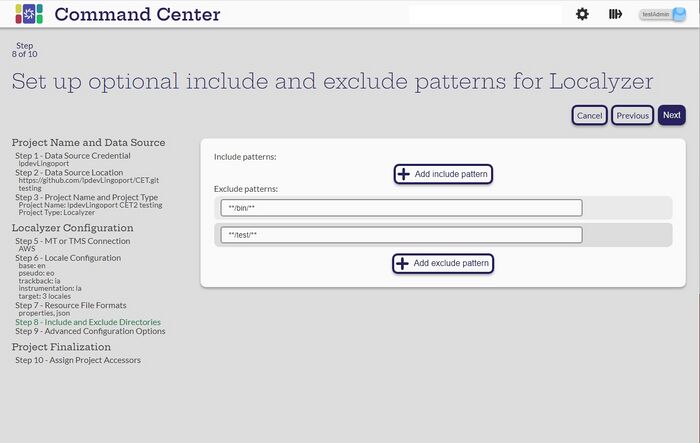Difference between revisions of "Include and Exclude Patterns"
| Line 13: | Line 13: | ||
| + | [[Resource File(s) Format |<== Back to Step 7: Resource file formats]] |
||
| − | ---- |
||
| − | |||
| − | [[Step by Step Project Creation |Step 1:Data Source Credential for the project]] |
||
| − | |||
| − | [[Choose a Repository|Step 2:Choose a Repository]] |
||
| − | |||
| − | [[Name The Project and Type |Step 3: Name the Project]] |
||
| − | |||
| − | [[Creating a Globalyzer Project |Creating a Globalyzer Project - Step 4: Globayzer Lite Definition File]] |
||
| − | |||
| − | [[Creating a Localyzer Project| Creating a Localyzer Project - Step 5: Which MT or TMS will Localyzer use ]] |
||
| − | |||
| − | [[What are the Localyzer locales| Step 6: What are the locales Localyzer is acting on? ]] |
||
| − | |||
| − | [[Resource File(s) Format| Step 7: Resource file formats]] |
||
| − | |||
| − | [[Include and Exclude Patterns|Step 8: Set up optional include or exclude patterns]] |
||
| − | |||
| − | [[Optional Localyzer Settings|Step 9: Optional Advanced Localyzer Settings]] |
||
| − | |||
| − | [[Grant Users and Teams Access | Step 10: Grant Users and Teams Access]] |
||
Revision as of 19:47, 5 September 2023
This is used to denote resource locations or to verify that other files are not mistaken for resource files.
For example:
- If all the resource files are in a folder called
resourcesthen the Include Patterns would be**/resources/** - If there is a file such as
config.propertieswhich is not a resource file, then the Exclude Patterns would look like**/config.properties
Select Next
